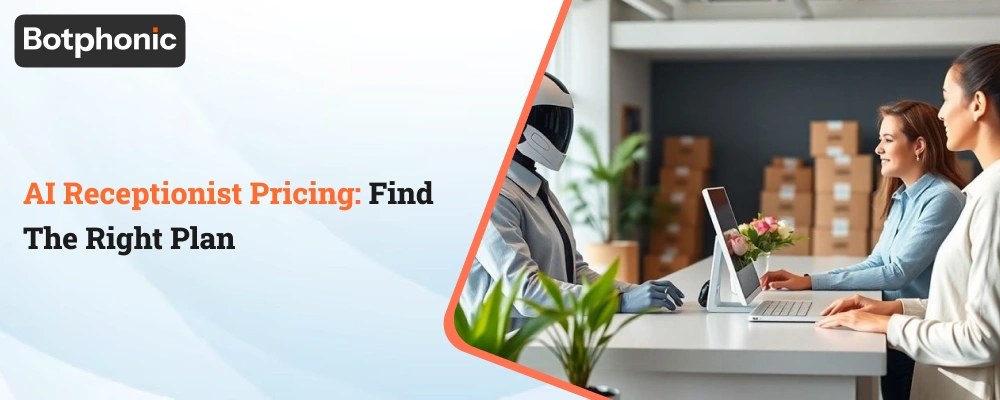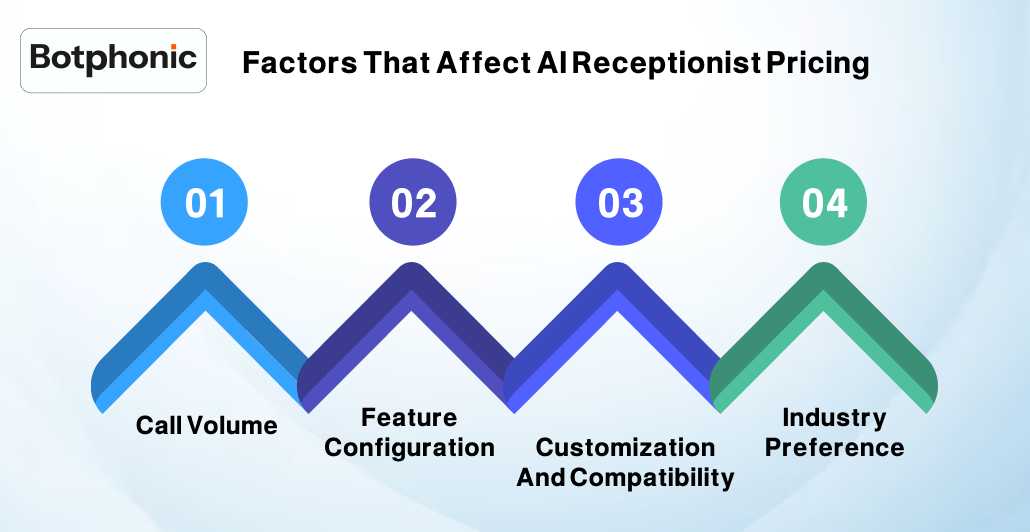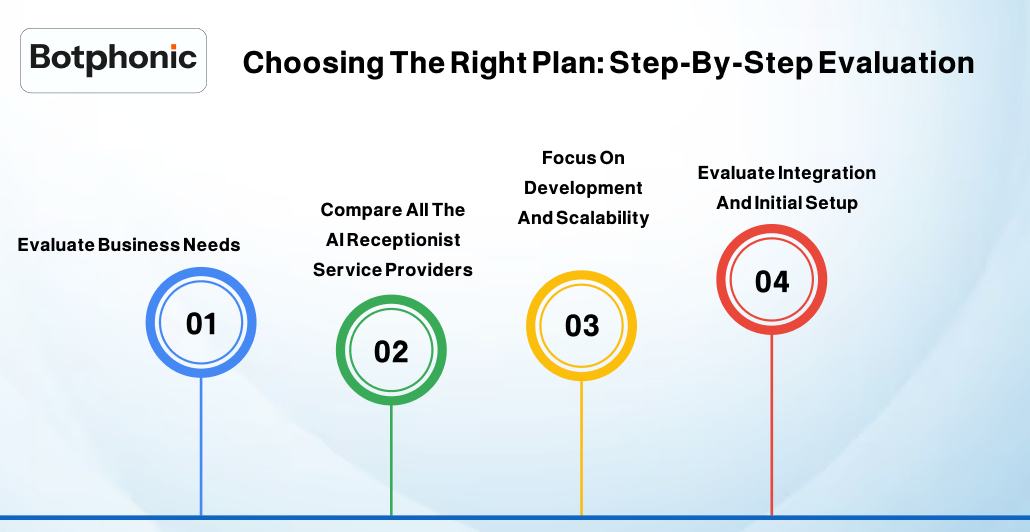
Summarize Content With:
Summary
AI receptionist pricing usually varies from $25 to $3000 per month. Mid-size and small businesses usually select $50 to $300 monthly plans that depend on features, call volume and industry-specific needs. Plans are tailored for all types of organizations. Basic entry packages for limited calls and enterprise-grade solutions for high call volumes, 24/7 coverage, and advanced automation. Sometimes installations are chargeable, but you will get long-term benefits with instant response, fewer errors and crm and calendar integration.
Choosing the right plan means balancing cost, features and growth needs. Good news is that now you can easily calculate ROI with the help of transparent pricing and customizable packages. Now the question is which plan you should choose that aligns with your business goals. Whether you need to save time, cut cost or want to make the customer experience smooth, by exploring pricing models you can select the best receptionist solution for your business. Read this blog; here I will discuss AI receptionist pricing. To choose the right plan, you need to understand pricing models, essential features and cost drivers. This makes the buying process a more strategic and customizable decision for every business. Let’s begin!!!
Introduction
In 2025, AI receptionist cost has become an important factor for businesses looking for operational efficacy and sustainable growth. AI receptionist price typically varies from $25 to $3,000 per month but depends on features like call volume and multilingual support, advanced integration and industry-specific customization. If you compare it with a human receptionist whose annual salary varies from $37,000 to $50,000 plus benefits and office expenses, then the AI alternative can bring huge savings.
How many potential clients have slipped away for not receiving the calls at the right time? Not getting calls on time is a problem that 90% of businesses face. That’s the reason the popularity of AI receptionist is getting higher. Imagine a dependable digital personal assistant that never gets tired and never misses a call. Sounds perfect, right? But here is the catch: AI receptionists are affordable and efficient, but not perfect. Do you think a machine can truly replace human warmth? Will your clients tolerate a robotic tone where they need empathy and understanding?
That’s the reason choosing an AI receptionist is not about convenience; it’s about balancing both the pros and cons. And the most important step is to understand the pricing. Plans vary from $25 to $3,000 per month, but most of the business fits in $50–$300. Now, you may be wondering, “Why is the range so wide?” Because cost does not depend only on answering calls; features like appointment scheduling, CRM integration, call volume handling and industry compliance have the biggest impact.
Factors That Affect AI Receptionist Pricing

Let’s check out:
1. Call Volume
The more calls your company gets, the more it will affect the prices. High call volume means you need to buy bigger plans in which extra minutes and calls per month are included. Just think, your customer is calling you and your plan limit gets crossed. What will happen? You need to pay extra charges, or your calls may get missed.
In both situations you will harm the customer experience. If your business encounters unpredictable and seasonal traffic, then usage-based pricing is a smart option for you. This will provide you immense flexibility without overpaying; you can scale the features as per your business needs.
2. Feature Configuration
The more advanced features you add to your AI receptionist, the more pricing you need to pay. Features like multilingual services, niche-specific operations, HIPAA adherence, and advanced CRM/scheduling integrations, this will make your business smarter, but you need to pay a higher monthly fee.
Just imagine, your customers are speaking in their native language, and your AI call assistant speaks only one language, whats your client’s first impression? Friendly or frustrating? Industries like healthcare, finance, and banking require specialized features; that’s the reason their prices may vary from $200 to $500+ per month. But certainly you will get higher returns—better security, intuitive workflows and one higher-quality customer experience.
3. Customization and Compatibility
Your AI receptionist is powerful only when it is capable of connecting with Salesforce, HubSpot and custom back-office systems. The more complex the integration it possesses, the higher the setup fee and premium plan cost it comes with. Just think how much time you could save if your AI voice assistant automatically updated the lead in the crm system and synchronized with the appointment scheduler.
It minimizes the burden of manual data entries and discrepancies. Higher-tier plans include integration features, but if you need a fully customized solution, then you need to pay extra development charges. Overall, you need to pay a high price, but you will get a significant return. Further, your workflows will become smooth, and your business automation will reach a more advanced level.
Get 24/7 coverage, cost savings, and smarter automation
Book Your Free Botphonic Demo Now!4. Industry Preference
Every industry has unique specifications. Doctors, offices, law firms, and enterprises need AI receptionists that are particularly trained for their domains. Obviously, it means a higher licensing fee and extended setup cost. If a client of a law firm called you and your receptionist couldn’t understand legal terminology, would you be impressed? Absolutely not!! Here’s your generic AI receptionist solution failing.
Customized, industry-focused AI solutions are prohibitively priced, but their returns are outstanding higher efficacy, accurate responses and deeper automation. This makes customers feel they are dealing with a true professional, not just a bot.
Cost-Saving Advantages
An AI receptionist is a smart investment that could save $250,000 in five years for a small business if we compare it with the full-time human receptionist salaries. An AI receptionist not only saves salary but also reduces the chances of missed calls, improves lead capturing and makes appointment attendance better.
All these factors directly impact revenue and customer satisfaction. Just consider how much money you could lose if you missed every call you had from potential customers. Do you think a human receptionist is capable of handling calls 24/7? Practically, it’s not possible.
With an AI receptionist, you will have the following:
- No paid leaves, health benefits and overtime costs.
- Unlimited simultaneous call handling without delays.
- Higher consistency and reduced human errors.
- Faster onboarding: unlike human agents, AI receptionists don’t take weeks to get trained.
Choosing the Right Plan: Step-by-Step Evaluation

Let’s check out:
1. Evaluate Business Needs
Just think, if your core need is appointment booking, but that feature is not available in your plans, then how will you benefit? Firstly, you need to discover your business needs, check:
- Estimate how many calls your business usually gets in a day; you can measure it more accurately if you have business data.
- Identify priority features like Appointment Scheduling, multilingual support, or smart call routing.
- Check your industry requirements factors, such as HIPAA compliance for healthcare and proper terminology and workflows for legal firms.
2. Compare all the AI Receptionist Service Providers
There are multiple vendors available in the market, but their pricing models, features list and packages are different. Therefore, it is important to compare your service providers.
- Check pricing: Are they a great option for your budget?
- Check features appointment reservation, multilingual assistance, integrations, and automation. Are they all covering your needs?
- Evaluate the package and add-ons. Check which plan is better for you: basic plans or high-tier plans?
- Test the free trial and demo; this will give you real experience before making a commitment.
What if you select your vendors without adhering to the aforementioned advice and later discover that your rivals are offering you superior features? How does it sound? To avoid this, it is better to evaluate the above factor and choose the vendors as per that.
3. Focus on Development and Scalability
Your business sizes don’t always stay the same. As your customer base and services increase, simultaneously your call volume also increases. So it is always better to select a plan that provides easy upgrades and scaling options. Few service providers offer flexible tiers so that you can smoothly shift to higher packages when your business demands increase.
You no longer need to stress about switching to new systems. Suppose you have purchased a plan that aligns with your current need, but what if suddenly your call volume becomes high? Will you reset the process from the beginning?? Absolutely no!!!. That’s the reason you should always finalize your plans keeping future growth in mind.
4. Evaluate Integration and Initial Setup
While selecting the plan, you should not fully capitalize on monthly fees. Understanding the extra cost of onboarding charges, integration and premium features is equally important. Few providers provide core features such as google calendar and crm connect completely free of cost.
But when it comes to advanced tools like Salesforce, HubSpot, or custom back-office systems, then you may incur setup fees and ongoing premium charges. Thus, it is important to have clear integration and setup charges to avoid any misunderstanding related to hidden charges in the future.
Pricing Models and What They Include
| Plan Type | Monthly Cost | What’s Included | Limits & Extra Costs | Notes |
| Basic / Entry-Level | $25–$50 | Limited call handling, basic message-taking, rudimentary appointment booking | Typically ~50 calls/month; additional fees are $0.18–$0.20 per extra minute | Best for small businesses with low call volume |
| Mid-Tier | $150–$400 | CRM integrations, custom greetings, advanced call routing, better automation features | Higher call volume included, but overage fees may still apply | Ideal for growing businesses needing more features |
| Setup Costs | One-time $250–$5,000 | Covers onboarding, integrations, custom workflows | Depends on complexity of integration with CRMs & tools | Some providers may waive or discount setup fees |
| Free Trials | Varies | Hands-on evaluation of features & usability | Usually limited time (7–30 days) | Helps test real-world fit before committing |
Conclusion
AI receptionist pricing is flexible and favorable to businesses that take strategic approaches in feature selection and call volume planning. By assessing needs, recognizing the true ROI, and looking at competitive packages, businesses can discover a plan that offers the best value, consistent customer coverage, and scalable automation for a fraction of typical staffing costs.
I hope the above articles provide you useful insights on AI receptionist pricing and how selecting the right plan will help you make informed decisions without stressing about budget limitations.
Still having doubts?? Connect with Botphonic!!!!

